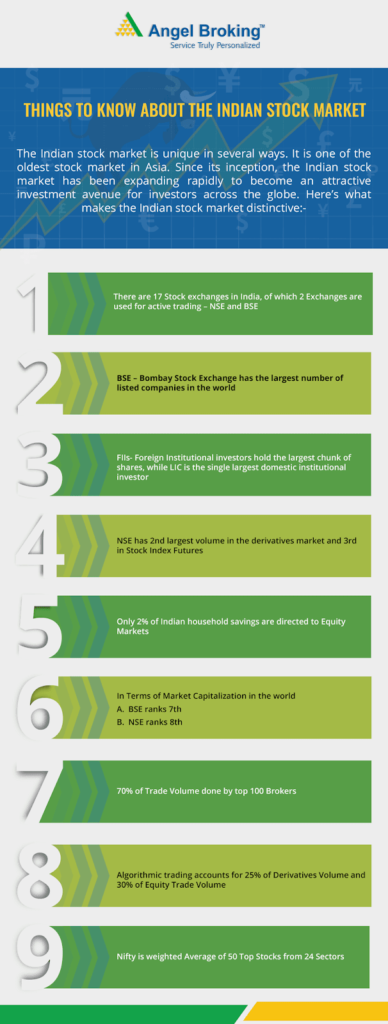
Share Market Basics
We all understand that a share in market parlance is part ownership in a company. So if a company has issued 100 shares and you own 1 share then you own 1% stake in the company. Share market is where shares of different companies are traded.
Difference Between Primary Markets and Secondary Markets
When a company comes out with an initial public offer (IPO) it is called the primary market. The normal purpose of an IPO is to get the stock listed in the share market. Once the share gets listed and bought, it starts trading further in the secondary market.
How are Shares Priced in the Market and Who Determines the Price?
The market determines the price of the share as per the usual rules of demand and supply. Normally, share prices go up when the company is growing very fast or it is earning very good profits or it gets new orders. As demand for the stock picks up more investors want to buy the stock at higher prices and that is how the price goes up.
Companies require money to take up large projects. They raise this through the issue of bonds, and bondholders are repaid through profits made on the project. Bonds are a kind of financial instrument where several investors lend money to companies.
For further information, watch the following video:
What are Stock Indices?
From the companies listed in the stock exchanges, a few similar stocks are grouped together to form an index. The classification may be on the basis of company size, industry, market capitalization, or other categories. The Sensex is the oldest index comprising shares of 30 companies and represents roughly 45% of the free-float market capitalization. The Nifty includes 50 companies and accounts for approximately 62% of its free-float market cap. Others include sector indices like the Bankex, market cap indices like the BSE Midcap or the BSE Small cap, and others.
What is Offline Trading and What is Online Trading?
Online trading is all about buying and selling shares on the internet sitting in the comfort of your office or your home. You just need to log into your trading account and you can buy and sell shares. Offline trading is trading by visiting your broker’s office or by telephoning your broker.
What is the Role of a Broker in the Share Market?
The broker helps you execute your buy and sell trades. Brokers typically help buyers find sellers and sellers find buyers. Most brokers will also advise you on what stocks to buy, what stocks to sell and how to invest money in share markets for beginners. For that service, the broker is paid brokerage.
Can Anybody Buy and Sell Shares in the Share Market?
Any person who is competent to enter into a contract can buy and sell shares in the market. You need to open a trading account with a broker and you can buy and sell shares in the stock market after the trading account is opened?
Trading Account vs Demat Account?
There is an important difference between the two. Trading account is where you execute your buy and sell trades. The demat account is where your shares are held in custody. When you buy shares in your trading account, your bank account gets debited and your demat account gets credited. The reverse is true when you sell shares.
What is Meant by Trading and Investment?
The fundamental difference is that trading refers to the short-term buying and selling of shares whereas investment refers to long-term holding and buying of shares. A trader normally tries to churn the money rapidly following short term events and market movements of prices of stocks of any company whereas the investor tries to buy a good stock in the sharemarket and waits for the stock price to appreciate over time.
What is Rolling Settlements?
Every order that is executed on the share market must be settled. Buyers receive their shares and sellers receive the sale proceeds. The settlement is the procedure wherein the buyers procure their shares and sellers receive their monies. The rolling settlement is when all trades have to be settled at the end of the day. In other words, the buyer must pay for his purchase and the seller delivers the sold shares in one day on the share market. Indian share markets adopt the T+2 settlements, which means the transactions are completed on Day One and the settlement of these trades must be completed within two working days from Day One. However, T+1 is currently being adopted in phases.
What is SEBI?
SEBI refers to the Securities and Exchange Board of India. Because the bourses have inherent risks, a market regulator is required. The SEBI is provided with this power and has the responsibility of developing as well as regulating the markets. The basic objectives include protecting investor interest, developing the share market, and regulating it’s working.
Are the Equity Market and the Derivative Market One and the Same?
Both equity market and derivative market are part of the overall stock market. The difference lies in the products traded. The equity market deals in shares and stocks whereas the derivative market deals in futures and options (F&O). The F&O market is based on an underlying asset like equity shares.
What is fundamental and technical analysis?
Fundamental analysis is about understanding the business of the company, its growth prospects, its profitability, its debt etc.Technical analysis focuses more on charts and patterns and tries to find out past patterns to apply for the future. Fundamentals are used more by investors while technicals are used more by traders.
Minimum investment in the Share Market
There is no minimum investment required as you can even buy 1 share of a company. So if you buy a stock with a market price of Rs.100/- and you just buy 1 share then you just need to invest Rs.100. Of course, brokerage and statutory charges will be extra.
Statutory Charges like GST, stamp duty and STT are imposed by either the central or the state government. The broker does not get these payments. The broker just collects these on your behalf and deposits it with the government.
Why do Companies opt for listing?
- Ease of raising funds
- Brand Image improves
- Easier to liquidate existing shares
- Enforces efficiency via transparency and regulatory oversight
- Liquidity increases as well as credit worthiness
How are the market weights for stock indices calculated?
Step 1 Calculate the total market cap of each stock in the index
A company’s total free-float market cap would be each share price multiplied by the total number of publicly traded shares
Step 2 Calculate total market cap of all the stocks
To calculate the total market cap of the index, the market cap of all the companies included in the index can be added.
Step 3 Calculate Individual Market Weights
It is important to calculate the individual market weights to know how much stock of one company influences the value of the index.
You can derive individual market weights simply by dividing the free-float market cap of an individual stock by the total index market cap. Logically, the more the market weight, the more percentage changes in its stock price will affect the value of the index itself.
Here are few point to know about the traditional mechanism of share market in India:
Trading Mechanism
The majority of trading in India is done on the Bombay Stock Exchange (BSE) and National Stock Exchange (NSE). Trading in both these stock exchanges is conducted through an online electronic limit order book. This means that buy and sell orders are matched through trading computers. The Indian stock market is order-driven where buyers and sellers remain anonymous, providing greater transparency to all investors. Orders are placed through brokers, most of which now provide online share trading services to retail investors.

Types of Mergers
Sometimes, the share market witnesses mergers of major companies. The following are the different types of mergers:
Horizontal Merger
A horizontal merger refers to when two competing companies, offering similar products or services, come together with the objective of benefiting from economies of scale. The main objectives of horizontal mergers are to lower costs, reduce competition, increase efficiency, and control the market.
Vertical Merger
A vertical merger happens between companies that operate along the same supply chain; such as companies involved in the production and distribution process of a business. Vertical mergers aim for higher quality control, better flow of information along the supply chain, generating more profits and reducing costs.
Congeneric Merger
Congeneric mergers happen between companies in the same industry, but with different business lines. This merger results in either an extension of a product line or a related market. Such mergers aim at diversification of products and services, bigger market share, and profit maximisation.
Conglomerate Merger
A conglomerate merger involves 2 or more companies from unrelated industries having varied businesses.
-
A pure conglomerate merger involves companies that are totally unrelated and have no overlap.
-
A mixed conglomerate merger involves companies that are looking to expand product lines or target markets.
Reverse Merger
Reverse Mergers are also known as Reverse Takeovers (RTO). This happens when a public company is merged with a private company. Reverse mergers have helped large Private companies to go public without an IPO. However, it poses certain risks for investors since the companies don’t undergo the strict IPO checks before getting listed.
Open Demat Account Now
Comments are closed